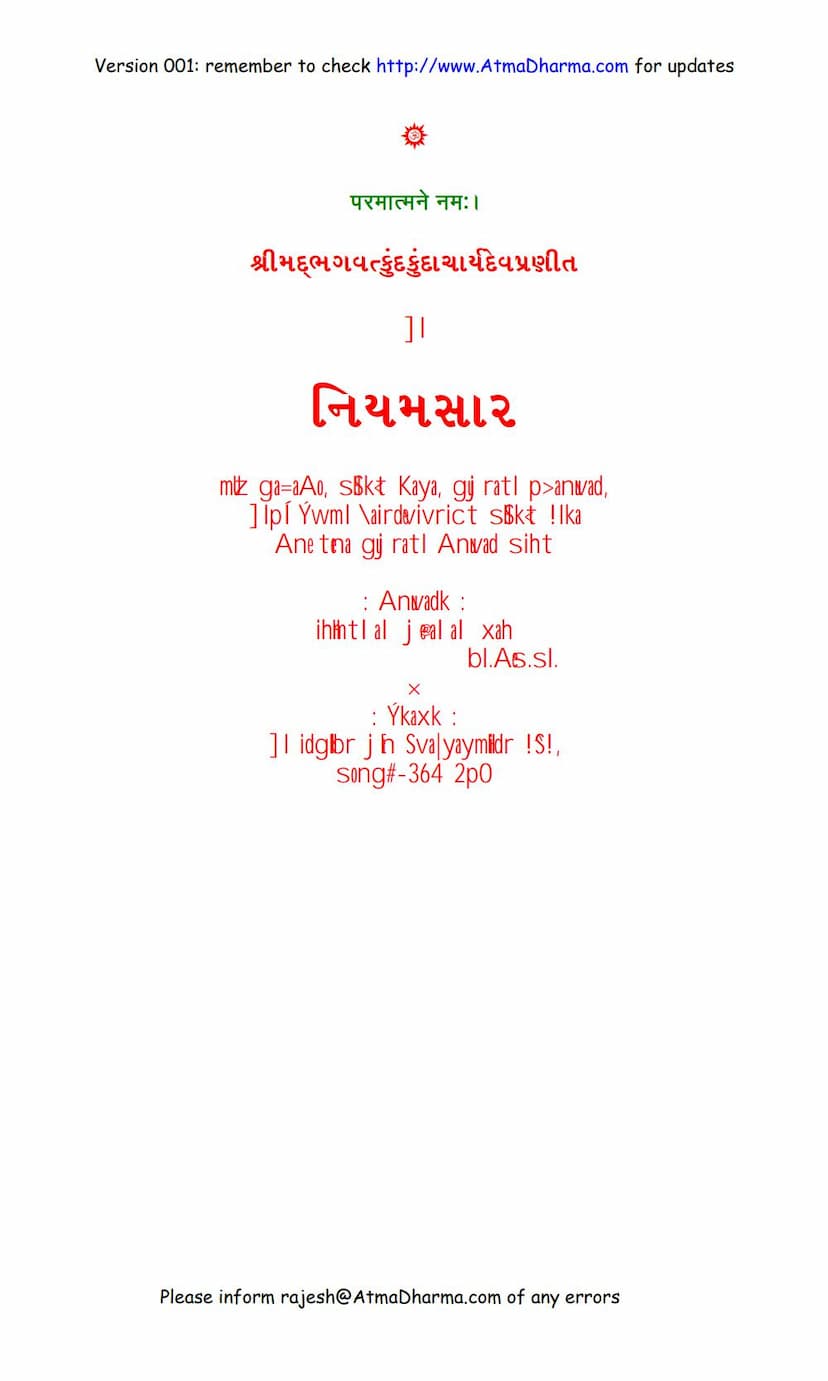Niyamsara
Added to library: September 2, 2025

Summary
Certainly! Here's a comprehensive summary of the Jain text "Niyamsara" based on the provided information:
Book Title: Niyamsara Author: Kundkundacharya (Compiler/Author), Himmatlal Jethalal Shah (Translator/Commentator) Publisher: Digambar Jain Swadhyay Mandir Trust Catalog Link: https://jainqq.org/explore/008272/1
Overall Summary:
"Niyamsara" (Meaning "Essence of Precepts" or "The Essential Rule") is a profound Jain scripture authored by the revered Acharya Kundkundacharya, a prominent figure in the Digambara Jain tradition. The text, as presented in this version, includes a Gujarati translation and commentary by Himmatlal Jethalal Shah, published by the Digambar Jain Swadhyay Mandir Trust.
The "Niyamsara" is considered a "Paramagam," a supreme scripture that delves into the ultimate truths of Jain philosophy, focusing on the path to liberation (moksha). It elucidates the fundamental principles of Jainism, particularly concerning the nature of the soul (Jiva) and the path of righteousness (dharma). The text systematically guides the reader from the empirical understanding of reality (Vyavahara) to the absolute, spiritual reality (Nishchaya).
Key Themes and Structure (Based on the provided Table of Contents and Shloka/Gatha titles):
The provided information offers a detailed glimpse into the structure and content of the "Niyamsara," organized into distinct chapters or "Adhikars" (sections) focusing on various aspects of Jain doctrine and practice:
-
Jiva Adhikar (Chapter on the Soul): This foundational chapter likely explores the nature of the soul, its inherent qualities, its bondage to karma, and the path to its liberation. It seems to cover aspects like the soul's true nature (Svarupa), the distinction between essential (Nishchaya) and empirical (Vyavahara) perspectives, and the process of spiritual purification.
-
Ajiva Adhikar (Chapter on Non-Soul Matter): This section would detail the nature of non-soul substances in Jainism, primarily Pudgala (matter) and its various forms, as well as other categories like Dharma (medium of motion), Adharma (medium of rest), Akasha (space), and Kala (time). It would explain their characteristics and their role in the cosmic order.
-
Shuddha Bhava Adhikar (Chapter on Pure States of Being): This chapter likely focuses on the liberated soul's state of being, characterized by pure consciousness, omniscience, omnipotence, and eternal bliss. It would emphasize the attainment of the soul's intrinsic nature, free from all karmic impurities.
-
Vyavahara Charitra Adhikar (Chapter on Empirical Conduct): This section would elaborate on the practical aspects of Jain conduct, likely detailing the five vows (Ahimsa, Satya, Asteya, Brahmacharya, Aparigraha) and the associated ethical guidelines (Samitis and Guptis) that govern the conduct of monks and householders. It emphasizes the empirical path of righteous living.
-
Paramartha Pratikramana Adhikar (Chapter on Ultimate Self-Reflection/Repentance): This chapter likely delves into the profound spiritual practice of introspection and self-correction. "Pratikramana" signifies turning back from errant paths and reaffirming one's commitment to the soul's true nature. It would cover the process of recognizing and rectifying faults.
-
Nishchaya Pratyakhyana Adhikar (Chapter on Absolute Renunciation): This section would focus on the ultimate, internal renunciation of all worldly attachments and passions, the core of Nishchaya (absolute) practice. It would distinguish this from merely external abstinence.
-
Param Alochana Adhikar (Chapter on Ultimate Self-Criticism/Confession): This chapter likely discusses the practice of introspection and the sincere confession of faults, not as a mere ritual, but as a profound spiritual cleansing of the soul. "Alochana" in this context refers to deep self-reflection and purification of inner states.
-
Shuddha Nishchaya Prayashchitta Adhikar (Chapter on Pure Absolute Atonement): This section would explain the ultimate form of atonement, which lies in realizing the soul's inherent purity and freedom from all karmic bondage through Self-realization. It's not about external rituals but internal purification.
-
Param Samadhi Adhikar (Chapter on Ultimate Meditation/Concentration): This chapter would explore the highest state of meditative absorption (Samadhi), where the soul is entirely focused on its pure, blissful nature, leading to the dissolution of all subtle karmic traces.
-
Param Bhakti Adhikar (Chapter on Ultimate Devotion): This section would likely discuss the highest form of devotion, which is not to external deities but to the enlightened soul, the realized Self, as the ultimate object of devotion.
-
Nishchaya Paramavashyak Adhikar (Chapter on Absolute Essential Duty): This chapter would focus on the essential, unwavering duty of the soul towards its own true nature – Self-realization and liberation, distinguishing it from external observances.
-
Shuddha Upayoga Adhikar (Chapter on Pure Consciousness/Application): This final chapter would likely elaborate on the state of pure consciousness (Shuddha Upayoga) where the soul is fully absorbed in its own intrinsic nature, leading to the ultimate liberation.
Significance:
The "Niyamsara" is a crucial text for Jains seeking to understand the essence of their spiritual path. Acharya Kundkundacharya's profound insights, explained through the commentary of Himmatlal Jethalal Shah, provide a roadmap for spiritual progress, emphasizing the interconnectedness of virtuous conduct (Vyavahara) and ultimate Self-realization (Nishchaya). The text guides practitioners towards recognizing the soul's inherent purity and achieving liberation from the cycle of birth and death.
The publication by the Digambar Jain Swadhyay Mandir Trust highlights its importance within the tradition, making these profound teachings accessible to a wider audience.